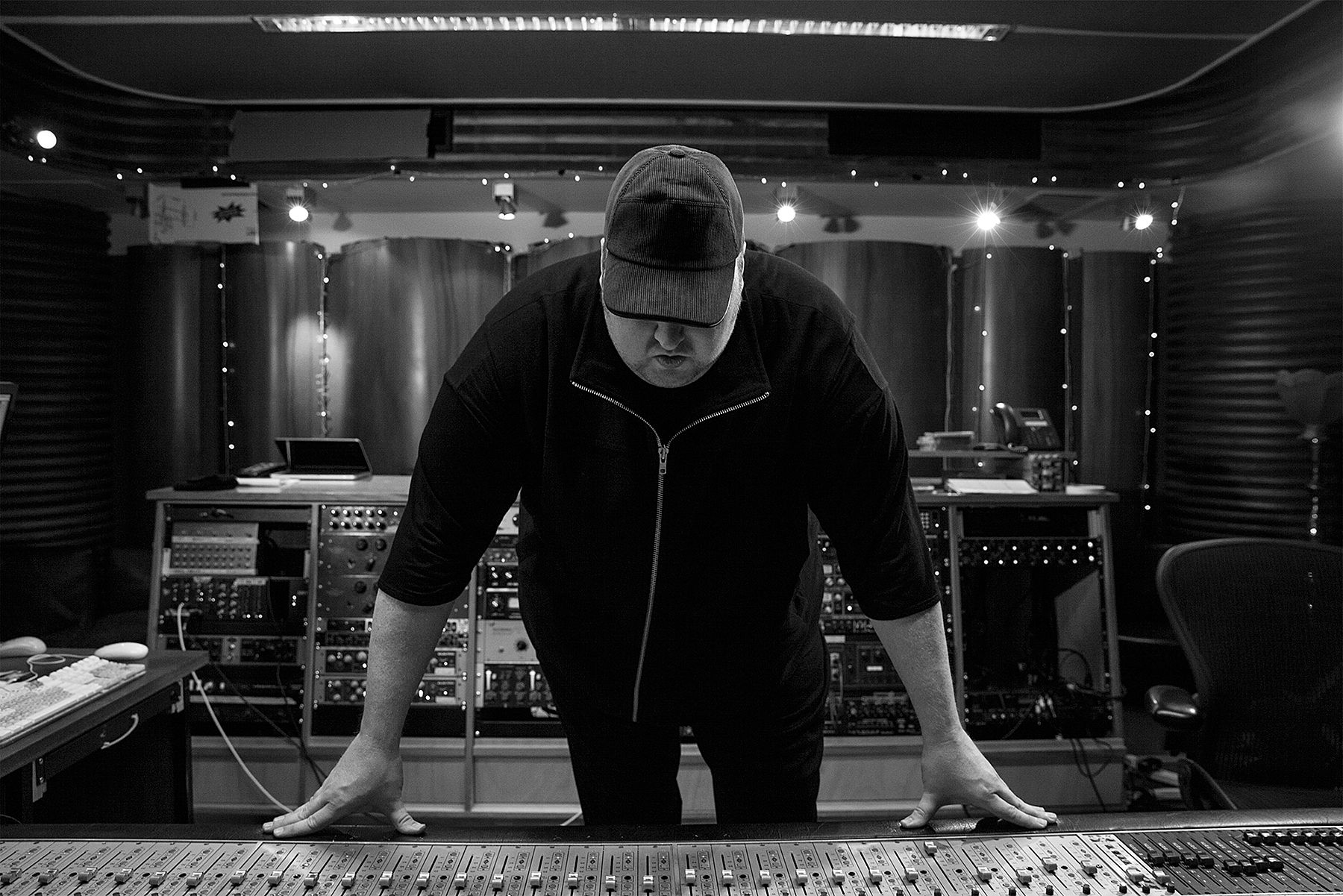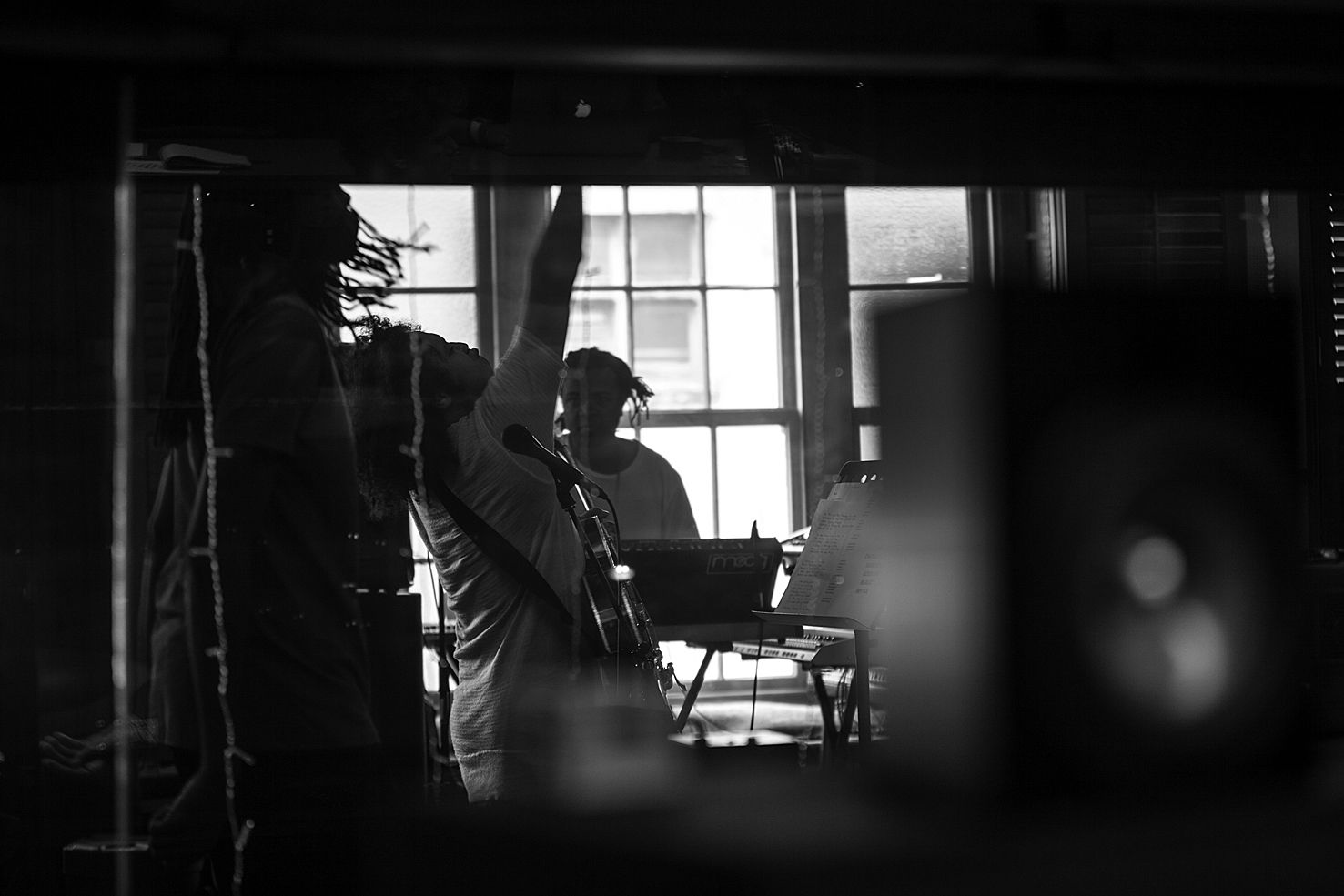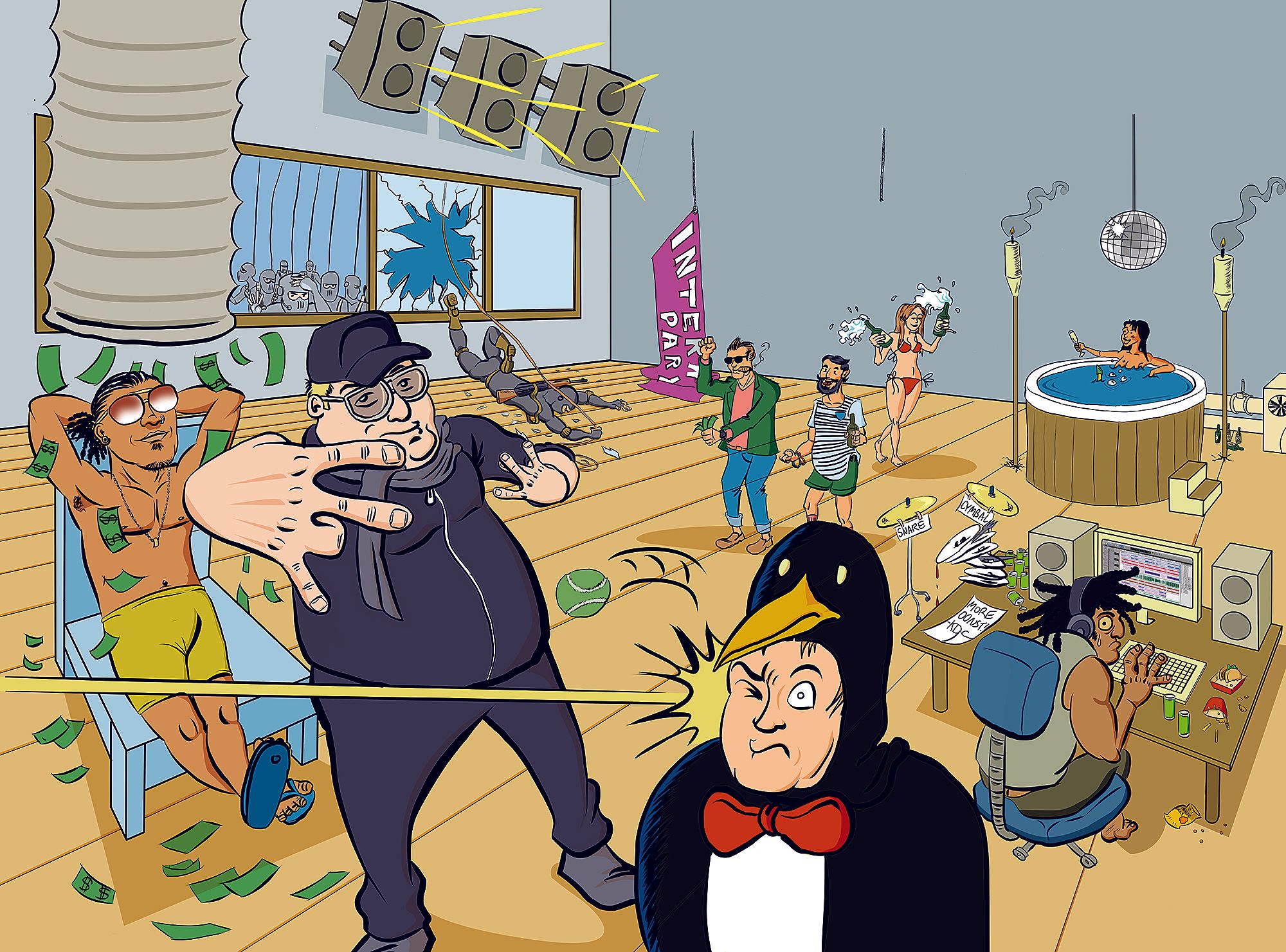Sonic Doom: The Madness and Mayhem of Making Good Times
Court documents suggest Kim Dotcom spent $1,000,000 on Grammy winners, ad campaigns and the best studio in the country. So why was his much-derided album such a disaster?
This article originally appeared in 1972 (out now) and has been republished here with the generous permission of its editor, Duncan Greive.
The young recording engineer looked in some pain. Tennis balls were being smashed into his body at full speed, in front of a crowd of people. This wasn’t what he’d signed up for. He had been hired to work on one of the most expensive albums in New Zealand music history – the debut by internet entrepreneur and fugitive from US justice, Kim Dotcom.
When the group weren’t recording, though, they indulged in hijinks and hazing. On this day witnesses describe the engineer as being dressed for tennis in a penguin costume. The hitter was an excellent tennis player. According to witnesses, Dotcom looked like he enjoyed the episode.
The young man went to work the next day covered in bruises, pulling up his shirt to show colleagues the blossoming patches of tender purple flesh. It wasn’t an isolated incident. He’d also reportedly vomited after being told to drink a cup of soy sauce during a recording session. Pranks and dares were hazards of the job. Making Dotcom’s Good Times meant enduring some pretty terrible times.
Neil Finn was on tour when he got a message saying he had a new client who had the personalised plate ‘God’. The recording space Finn had built in Newton, Roundhead Studios, had been booked out by a 2-metre-tall German millionaire with a flair for the flashy and dramatic. Security guards milled around as Dotcom strolled into the studio for the first time, reeking of money. It was 2011, the beginning of two years of endless throbbing dance music; of swollen egos, late night tirades and 16-hour working days. I was told stories about the sessions which featured dwarf strippers and golliwog dolls, uncomfortable casual racism and celebrity cameos. Dotcom was set on becoming a recorded artist, and he was doing it the only way he knew how: with unshakeable confidence and incredible extravagance.
dwarf strippers and golliwog dolls, uncomfortable casual racism and celebrity cameos. Dotcom was set on becoming a recorded artist, and he was doing it the only way he knew how: with unshakeable confidence and incredible extravagance.
Good Times cost $1,000,000, according to court documents, making it one of the most lavish productions in New Zealand music history. Dotcom hired out Roundhead’s plushly appointed top floor studio for unprecedented durations. All day, every day, for months. He turned it into his private kingdom. Time and space seemed to start warping to suit him.
Cairo Knife Fight frontman and Good Times’ guitarist Aaron Tokona says it was like being “inside the orbit of another planet.” Artists involved included Printz Board, the Grammy Award-winning Black Eyed Peas collaborator, Roc Nation producer Deryk ‘Sleep Deez’ Mitchell and Tiki Taane. They all had to operate on Dotcom’s often-nocturnal schedule.
“We were there to all hours of the morning,” Tokona says. “You’re not used to seeing people who could come in and record something at one in the morning, get a film crew and then shoot a video.”
Early on in recording, chief sound engineer Neil Baldock waited at the studio receiving texts telling him Dotcom would be there in an hour, a source says. Then half an hour. 24 hours passed. Dotcom didn’t arrive. “He’d play video games for two days then sleep for two days, play music for two days and then go home and play Call of Duty again,” Tokona recalls. “It was all on Kim’s schedule. You had to be ready when he wanted.”
When Dotcom arrived, it was a hurricane of activity. He would sit at a specially-appointed chair, surveying his staff and listening through the music they had come up with while he was away. He approved and dismissed it with swift certainty, sifting through and saying “Yes, that works”, “No” or “That’s awful”. We approached Dotcom multiple times through a representative, but he declined to comment for this story.
Laughton Kora’s job was to write music that Dotcom would say yes to. The singer and songwriter had been in music for nearly two decades, experiencing multi-platinum selling success with his band Kora’s 2012 album Light Years. He’d seen his share of studios. But this was another world. Dotcom wasn’t interested in acoustic instruments and traditional melodies. “Everything was tech,” says Kora.
He was set to work making sounds and rhythm: electronic cacophonies, melded synth lines, cascading percussive noises and layered guitars. “It was the ability to write free. I could write not even beats, but just soundscapes. Almost for film,” he says. “He’d go ‘cool, we might be able to use those tones in [a song]. Go back and now this time just work on one kick [drum sound]. And I’d just work on 150 different kicks for the day.”
There was infinite time. Infinite money. For months, Kora barely left the studio, staying inside his isolated writing station for stretches of four days or more. “They were bringing food to me because I didn’t want to stop,” he says. The hours blurred as Kora and the team worked to sculpt the sounds in Dotcom’s head.
Dance music pulsed through the studio speakers, almost uninterrupted. Dotcom wanted to be taken back to the ‘90s, when he was still making a name for himself as an extravagant computer hacker-turned-investor, luring paparazzi to hired superyachts and throwing parties for models and millionaires. He hoped to relive his youth, when he drove luxury cars at more than 200km/hr, trance and dance music on the stereo.
“The music. It was fucking torture,” a studio source says. “You go a bit nuts when you’re hearing that for weeks on end without days off. You can go pretty crazy.” Tokona couldn’t stand it either. “The music wasn’t very genre specific. It was just fucking awful."
The non-stop sound, combined with the long hours and pressure, started to wear on some people’s nerves. Relationships started to fray. Tokona went from being intrigued by his boss to despising him, calling him “a selfish, egotistcal wanker” online. His feelings only strengthened post-recording, leading to a series of venomous Facebook posts and damaging press stories.
Meanwhile, unbelievable drama had engulfed Dotcom’s already-dramatic life, with an action movie-style raid on his Coatesville mansion, followed by his imprisonment and endless extradition trial. The last time authorities had struck at him was in 2002, when he was arrested by Thai police for insider trading. In response, Dotcom posted on his website, he was going to kill himself live on the internet, perhaps to become a post-human creature living online. It was a cry for attention, Dotcom’s friend would later tell Der Spiegel. Dotcom was deported back to Germany, where he spent five months awaiting trial.
He was convicted and given a suspended sentence. The run-in with the law was a turning point. Dotcom moved to Hong Kong, away from the spotlight. A few years passed before his name started to be connected to the massively popular file-sharing website Megaupload. It was only in 2011, the year he moved again – this time toNew Zealand – that he was officially named as its founder.
Dotcom had built himself back into a bigger force than ever. Megaupload accounted for four per-cent of internet traffic at its height. It had more than 200 staff, net income of up to US$175 million and nearly 200 million registered users.
There was a downside: the site was populated with vast amounts of copyright content that users shared and illegally downloaded. Movie studios and record companies saw Dotcom as the pirate king, making millions off the backs of artists like the ones he was hiring at Roundhead. He wasn’t a former hacker-turned legitimate businessman. He was the single-biggest threat to their business since Sean Parker invented Napster. They wanted to take him down again, this time for good.
Back in the studio, Dotcom became combustible following the raid. His moods could be intense and unpredictable. He could be a great boss, or a terrible one. “Everyone knew when he was in a bad mood it was going to be the worst day in the world,” a source says.
Tokona remembers an incident where the Black Eyed Peas singer, apl.de.ap, came to a party at the Dotcom mansion with an entourage. Dotcom started pestering the star, trying to get him to appear on Good Times, Tokona says. “When they said no, he just turned away. He just completely ignored the whole crew of people. Froze them out,” he says. “That’s someone who is master of the universe. He could influence people by using riches to make his world a reality.”
But when Dotcom was in the mood to laugh, his humour was rambunctious; lacking in boundaries. Tokona says he helped spearhead the dares and bets like that meted out to the young, tennis ball-pelted recording engineer.
The recording team got used to living in Dotcom’s surreal world. They would turn up in jandals for free dinners at Euro; party nights away at the mansion. Rihanna dropped by the studio, Kora says. Printz Board hired a dwarf stripper for Baldock’s 40th birthday.
The team held ‘racist days’ amidst the weirdness. “Everyone got to relieve themselves of their political correctness and just hammer each other,” Tokona says. The ‘n’ word would fly. A Jewish staff member was teased about how much he was getting paid. Things got more uncomfortable after Dotcom found out about the jokes. He wanted to join in, calling people “my n*****” and bringing in a pair of golliwog dolls for Mitchell and Printz Board.
“The golliwog dolls were unintentionally dark. The American guys were not very impressed by that,” according to a source.
The ‘racist days’ later became an embarrassing news story, after Tokona mentioned them to a reporter at The Press. They got a second life as an addendum to news stories revealing that Dotcom owns a first edition copy of Mein Kampf signed by Hitler. Dotcom told media the book was part of a larger cache of World War II memorabilia, and he is “totally against what the Nazis did.”
Tokona says it was “stupid and wrong” for Dotcom to participate in the name-calling. Kora disagrees, saying the racist days were “funny as hell” and Tokona has double standards. “When it suits him he can n***** everyone else up. N***** this and n***** that. But oh no, a German can’t do it. A German amongst a bunch of black people and Maori can’t do it. Oh no, there’s a line.”
Besides, Dotcom was on the receiving end of as much race-based needling as he dished out, Kora says. He would sometimes respond to reprimands from his boss by referencing Nazi Germany, asking “Should I hit the showers?”
The joking stopped when Dotcom’s moods turned. The worst situation came late at night. He had been away, spending 30 hours non-stop regaining his world number one ranking in Call of Duty, Tokona says. When he finally arrived, he was seething with anger. He shouted at the team for not getting enough done in his absence, asking what he was paying them for, if it wasn’t to make music.
“I witnessed this guy motivating... people through fear and that was disgusting so I finished up my part and got outta there quick smart,” Tokona wrote in a Facebook post. It was a low point, Kora admits. “We were fucked. We were so tired. And he came in and he went off at us like: ‘Why do I pay you?’”
The team still got a lot done afterward, Kora says - staying at the studio until near dawn, working feverishly to make something that would impress their boss. They were driven onward by the anxiety that came with having their jobs tethered to Dotcom’s temper.
“We were fearful because if we didn’t come up with the goods, we could just feel it in the room,” Kora says. “But we knew how lucky we were.”
Lucky to be paid well, when so many musicians aren’t. Lucky to be bought a meal every day. “I was putting food on my family’s table and paying my mortgage,” Kora says. Others, including Printz Board and Mitchell and his team, were living in luxury, he says. “Those guys had a mansion – their own little sleep-out mansion with a pool. They got given a car. They got paid really good money. They ate really well. And they worked at the best studio in our country.”
Finn says the luxury Dotcom paid for polluted his music. Printz Board and Mitchell seemed more interested in cashing pay-cheques than making a much-needed hit, he says. “I didn’t like the occupation of our studio by those guys because I sensed [they were] on the gravy train,” says Finn. The producers had “every opportunity” to change the ultimately disastrous direction of the recording. “[Dotcom’s] self-belief was absolute and he definitely made the decisions – but his collaborators were overpaid chancers.”
Others say Dotcom, and Dotcom alone, sabotaged the album. They say he became the worst kind of middle-manager: overruling the better ideas of his employees and refusing to relent on a tasteless, single-minded vision. He wanted walls of synth. Grinding beats. Senseless, repetitive lyrics. “Eurotrash,” in the words of one collaborator. “Kim was surrounded by amazing people but every time something amazing was written, he would dismiss it.”
Kora tried to let Dotcom know when a song was off. “We’d tell him: This won’t work bro. This is what we call homogenised, overproduced sound.” Dotcom would reply: I don’t care. I like to dance to it,” says Kora. “And we’d say: Well, okay.”
Kora was more upset with what he saw as bad lyrics. “I’d say to him: You know Kim, sometimes I like to write my songs around lyrics. He’d go to me: No, we’re going around beats. We just want people to dance.” Situations like that arose “daily", Kora says.
Kora and Tokona tried to adapt to Dotcom; mould their ideas to his tastes. They were scratching in the dark. Dotcom didn’t know how to play an instrument or read music. He once insisted he hated a snare hit. They isolated every snare sound only to find out the problem was a cymbal.
Kora experimented, recording acapella songs; a bassline made only from eight melded synth sounds. “Yeah there’s that thing of overcooking,” he says. “In the same sense, there was no overthinking it. We’d say, you know I’m going to make this song out of 15 synths, fuck it. Or we’d make it out of one guitar. There’s songs in there that have Irish fiddle. Dudes that can really play the fiddle.” He would have to tell Dotcom: “That’s a good song, man, but it’s not going to suit the thread of what you’re saying. Bugger.”
They ended up recording 156 songs. Only 17 made it to Good Times. The rest are still with Dotcom. Kora, Tokona and others insist there’s a great album locked away in his mansion.
“There was lots and lots of good music that was actually made but it never saw the light of day because it wasn’t Kim’s taste,” Tokona says. “His taste is what you can hear on that fucking atrocious album that actually got released.”
Dotcom didn’t know how to play an instrument or read music. He once insisted he hated a snare hit. They isolated every snare sound only to find out the problem was a cymbal.
No major label would touch Good Times, for obvious reasons. At first, Mikee Tucker didn’t want to either. He refused to put the album out through his label Loop Recordings, after listening through and deciding it didn’t fit with past releases for artists including Fly My Pretties, The Black Seeds and Hollie Smith. But his willingness to consider the task stood in contrast to nearly everyone else in the industry. Dotcom gave Tucker a job as album promoter.
By almost any conventional measure, he failed. The New Zealand Herald called the album “a musical mess” in a one-star review, while Elsewhere.co.nz described it as “utterly sexless”. Sales weren’t helped by Dotcom giving the album away for free on his website, but remained mediocre. Good Times debuted at number 20 in the New Zealand album charts in late-January, peaked at 8 and dropped out of the top 40 in early-March. It sold about 1000 copies at JB Hi Fi according to an industry source, despite getting blanket advertising on stores’ front windows. The Warehouse didn’t sell many copies either.
It wasn’t for lack of promotion. Record company sources say Tucker spent at least $100,000 of Dotcom’s money on radio ads, a digital campaign and, most memorably, plastering the album’s awful cover on buses, bus stations and billboards.
That estimate may be low. A representative from iSite Media - the company that booked the bus advertising - says Dotcom took out ads on between 80 and 140 buses over a month-long campaign. Tucker may have got a better deal, but Auckland Transport says it costs about $200,000 to place ads on 80 buses for a month.
In any case, Dotcom’s promo budget was “far in excess” of what Universal spent marketing the launch of Lorde’s album Pure Heroine. Record companies rarely spend $100,000 on promotion, and if they do, it’s for a hit album and 80 percent of the bill is for TV advertising.
For a few months, Dotcom’s face was everywhere: a digitally-enhanced flower clutched to his cheek, looking like he was being given wonderful and terrible news at the same time.
Everyone asked the same questions: Why? How did anyone think this was a good idea? When will it end?
Tucker tried to stop it. When Dotcom insisted on the cover, he told him it was a bad move. His “one regret” is not pushing back harder. “I’m a music guy. I was just guarding my relationship,” he says. “It was a shame. There’s an old saying: ‘Don’t judge a book by its cover’. But in this digital world, you do judge a book by its cover.”
He faced other challenges. Plans for a billboard by Wellington Airport were canned because officials judged it to be too political, he says. “It would have been great. Kim Dotcom’s face every time anyone flew in or out of the city.”
The mainstream media was an even bigger problem, Tucker says. He claims there was collusion between record companies like Sony, Universal and Warner and radio stations to keep Dotcom off the air. Record execs called radio station bosses, asking them not to playlist Dotcom’s songs and threatening retribution if they did, he says. A friend, an insider in the industry, told Tucker that radio stations caved in to pressure. Dotcom wasn’t playlisted on ZM, The Edge or any major pop station.
The blacklist is bullshit, radio executives say. Leon Wratt, the content director for MediaWorks – owner of The Edge – says the station tried to test out Dotcom’s songs with audiences and received “95 percent” negative feedback. “Mikee can make all the excuses they like but in reality that music wasn’t good enough,” he says. “If we put on songs that people think are shit then they won’t listen to us anymore. Thats what our game is.”
He admits record company executives have a very low opinion of Dotcom, but denies they threatened radio stations. “They need us to promote their artists,” he says. “I think there’s more chance that we didn’t actually go to the moon than that happening.”
Christian Boston, content director for 91ZM from 2000 to 2013, says the decision not to playlist Dotcom’s singles had nothing to do with record bosses or politics. His team at ZM thought the music was terrible, he says. “It just got a unanimous ‘No, it’s a crock of shit’, so we didn’t play it.”
Tucker’s noisiest complaint is reserved for the Herald, which he claims is a mouthpiece for Dotcom’s enemies – John Key and the National government. He says Good Times deserved more than the one star Chris Schulz gave it in TimeOut, the paper’s entertainment magazine.
“It’s just the journalists that always take the same cheap shots to sell that shitty publication,” he says. “The album was probably a three-and-a-half out of five.”
The review was more than fair, according to TimeOut editor Russell Baillie. “I can’t think of an album in the past year or so more deserving of a few cheap shots than Good Times. It was comedically awful and TimeOut didn’t exactly go out on a limb by saying that.” He has “sympathy” for the New Zealand artists who featured on the album. “I am sure one day they will all look at the experience and laugh, if they haven’t already.”
Selling Good Times was a tough job, Tucker admits. “It was hard for people to take seriously – a bit like Paul Holmes’s album.” However, he notes that many thousands of people downloaded it free as part of the soft launch of Baboom, a digital music service founded by Dotcom.
It led to a silver lining for Tucker. Despite the album’s fate, he managed to parlay his work into a plumb job as Baboom’s managing director, and is guiding it toward launch this year. “Personally my strategic goal was to get a job on Baboom,” he says. “Mission accomplished.”*
There were no silver linings for Dotcom. On September 20, he arrived at The Cloud on Auckland’s waterfront, beset on all sides by catastrophe. It was a post-election party for the political alliance he brokered, Internet Mana, following its brutal electoral failure. His wife had left him a few months earlier, a situation spitefully picked over in the gossip pages.
Good Times, which he had cared deeply about, had been a flop by most measures. Dotcom was despondent. The humbled giant trudged the floor, leaning over people who had worked on his record. He wandered up to Kora to commiserate.
“I’m sorry if I’ve ruined your career”.
Many of Dotcom’s critics caricature him as a movie villain: a black-clad foreigner living in a mansion scheming against the Government. It’s an idea he’s sometimes encouraged. An old YouTube clip shows him driving a luxury Mercedes in the Gumball 3000; a racing competition staged on civilian roads for a field of rappers and the nouveau riche. He pulls off a daring manoeuvre to escape authorities and turns to the camera, cackling “Dr Evil is always getting away with it.”
Those who’ve worked with Dotcom say he’s more like Tom Hanks in Big: A talented kid set loose in a toy store, possessing all the exuberance, narcissism and grandiosity that comes with adolescence. His formula – all self-belief and no self-awareness – led him to a life of superyachts and supermodels, fast cars, mansions and glory. In time it also led to him staring down the police, record execs and politicians that he thinks conspired to take him out.
Good Times was his first flop in New Zealand. The first time his confidence would lead him striding into extraordinary disaster. The first time his eyes cracked open to the great wave of public opinion coming to knock him down. The first time he didn’t get away with it.
Finn believes failure will serve Dotcom well; make him stronger. “I just think he had to learn humility in a very brutal New Zealand kind of way.
“But it might be the making of him. He is very smart and may yet win.”
Kora still goes over to Dotcom’s mansion sometimes, where he is holed up, mulling his pariah status and poisonous public image. Dotcom’s fallen many times, but if there’s one thing he’s always done, it’s get back up. Like any failed musician, he’s plotting a comeback.
They play video games. Kora sits there while Dotcom expertly kills him again and again. Kim, winning every time, like he used to. Like he hasn’t in a while. Every victory an exorcism. Then they start again.





